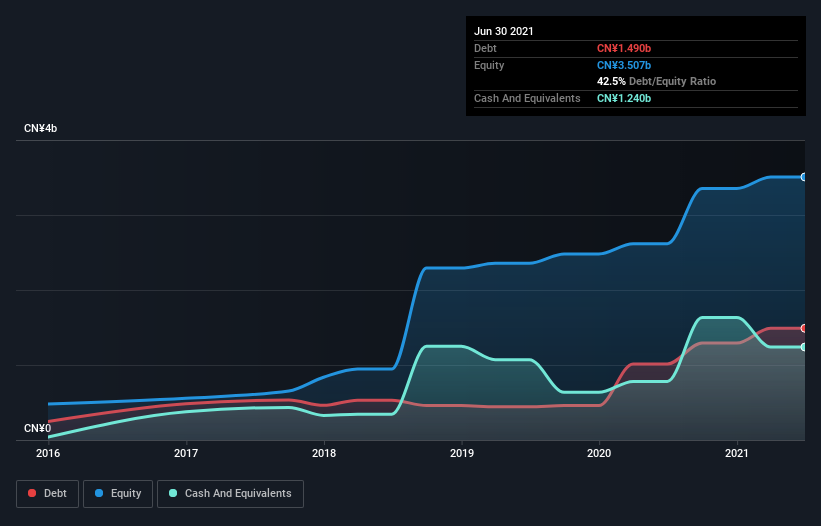- Hong Kong
- /
- Consumer Services
- /
- SEHK:1773
Does Tianli Education International Holdings (HKG:1773) Have A Healthy Balance Sheet?

Some say volatility, rather than debt, is the best way to think about risk as an investor, but Warren Buffett famously said that 'Volatility is far from synonymous with risk.' When we think about how risky a company is, we always like to look at its use of debt, since debt overload can lead to ruin. Importantly, Tianli Education International Holdings Limited (HKG:1773) does carry debt. But the more important question is: how much risk is that debt creating?
Why Does Debt Bring Risk?
Debt is a tool to help businesses grow, but if a business is incapable of paying off its lenders, then it exists at their mercy. In the worst case scenario, a company can go bankrupt if it cannot pay its creditors. While that is not too common, we often do see indebted companies permanently diluting shareholders because lenders force them to raise capital at a distressed price. By replacing dilution, though, debt can be an extremely good tool for businesses that need capital to invest in growth at high rates of return. The first thing to do when considering how much debt a business uses is to look at its cash and debt together.
See our latest analysis for Tianli Education International Holdings
What Is Tianli Education International Holdings's Debt?
The image below, which you can click on for greater detail, shows that at June 2021 Tianli Education International Holdings had debt of CN¥1.49b, up from CN¥1.01b in one year. However, it does have CN¥1.24b in cash offsetting this, leading to net debt of about CN¥249.7m.

How Healthy Is Tianli Education International Holdings' Balance Sheet?
Zooming in on the latest balance sheet data, we can see that Tianli Education International Holdings had liabilities of CN¥2.93b due within 12 months and liabilities of CN¥2.36b due beyond that. Offsetting these obligations, it had cash of CN¥1.24b as well as receivables valued at CN¥11.6m due within 12 months. So its liabilities total CN¥4.04b more than the combination of its cash and short-term receivables.
Given this deficit is actually higher than the company's market capitalization of CN¥3.83b, we think shareholders really should watch Tianli Education International Holdings's debt levels, like a parent watching their child ride a bike for the first time. In the scenario where the company had to clean up its balance sheet quickly, it seems likely shareholders would suffer extensive dilution.
We measure a company's debt load relative to its earnings power by looking at its net debt divided by its earnings before interest, tax, depreciation, and amortization (EBITDA) and by calculating how easily its earnings before interest and tax (EBIT) cover its interest expense (interest cover). This way, we consider both the absolute quantum of the debt, as well as the interest rates paid on it.
Tianli Education International Holdings's net debt is only 0.43 times its EBITDA. And its EBIT covers its interest expense a whopping 22.0 times over. So we're pretty relaxed about its super-conservative use of debt. On top of that, Tianli Education International Holdings grew its EBIT by 42% over the last twelve months, and that growth will make it easier to handle its debt. There's no doubt that we learn most about debt from the balance sheet. But ultimately the future profitability of the business will decide if Tianli Education International Holdings can strengthen its balance sheet over time. So if you're focused on the future you can check out this free report showing analyst profit forecasts.
Finally, a business needs free cash flow to pay off debt; accounting profits just don't cut it. So we always check how much of that EBIT is translated into free cash flow. During the last three years, Tianli Education International Holdings burned a lot of cash. While that may be a result of expenditure for growth, it does make the debt far more risky.
Our View
While Tianli Education International Holdings's conversion of EBIT to free cash flow has us nervous. To wit both its interest cover and EBIT growth rate were encouraging signs. Looking at all the angles mentioned above, it does seem to us that Tianli Education International Holdings is a somewhat risky investment as a result of its debt. Not all risk is bad, as it can boost share price returns if it pays off, but this debt risk is worth keeping in mind. The balance sheet is clearly the area to focus on when you are analysing debt. However, not all investment risk resides within the balance sheet - far from it. For instance, we've identified 4 warning signs for Tianli Education International Holdings that you should be aware of.
At the end of the day, it's often better to focus on companies that are free from net debt. You can access our special list of such companies (all with a track record of profit growth). It's free.
If you're looking for stocks to buy, use the lowest-cost* platform that is rated #1 Overall by Barron’s, Interactive Brokers. Trade stocks, options, futures, forex, bonds and funds on 135 markets, all from a single integrated account. Promoted
Valuation is complex, but we're here to simplify it.
Discover if Tianli International Holdings might be undervalued or overvalued with our detailed analysis, featuring fair value estimates, potential risks, dividends, insider trades, and its financial condition.
Access Free AnalysisThis article by Simply Wall St is general in nature. We provide commentary based on historical data and analyst forecasts only using an unbiased methodology and our articles are not intended to be financial advice. It does not constitute a recommendation to buy or sell any stock, and does not take account of your objectives, or your financial situation. We aim to bring you long-term focused analysis driven by fundamental data. Note that our analysis may not factor in the latest price-sensitive company announcements or qualitative material. Simply Wall St has no position in any stocks mentioned.
*Interactive Brokers Rated Lowest Cost Broker by StockBrokers.com Annual Online Review 2020
Have feedback on this article? Concerned about the content? Get in touch with us directly. Alternatively, email editorial-team (at) simplywallst.com.
About SEHK:1773
Tianli International Holdings
An investment holding company, provides education management and diversified services in China.
Exceptional growth potential with outstanding track record.
Market Insights
Community Narratives




